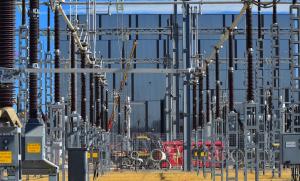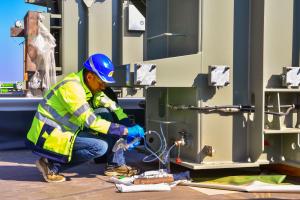Electrical system
Aiming for "zero fail"
23 Oct 2017
-
R.A.
If something goes wrong in your electrical installation at home you might lose the contents of your freezer—an aggravating occurrence but not a disastrous one.
The ITER electrical systemforms an exceptionally dense and complex network that originates in the 400 kV switchyard, extends over the entire ITER platform and penetrates deeply into every building.
In ITER, if a component in the electrical system fails the consequences can be serious, and have a significant impact on operations, schedule and cost.
Of course the ITER electrical system is a far cry from a home installation. With some 80 transformers of various power and size, hundreds of kilometres of cables, and switches and outlets by the thousands, it forms an exceptionally dense and complex network that extends over the entire ITER platform and penetrates deeply into every building.
"A large part of our equipment is industry standard, off the shelf," explains Massimiliano Camuri, an electrical engineer in the ITER Electrical Power Distribution Section. "But we also have a few components that are atypical and borderline prototype."
What makes the ITER electrical installation unique, however, is not so much the nature of its constituting components, but the presence of systems operating in distinct modes (steady-state and pulsed) and at different voltages.
"We want to achieve zero fail, and the first step in that direction is the careful follow-up of the commissioning of every component," says Massimiliano. "Then comes the maintenance, which must be both predictive and preventive: rather than having to fix a failure we want to anticipate it and understand the sequence of events that can eventually lead to a problem."
Massimiliano, who was responsible for the design, operation and maintenance of the electrical system at the European Very Large Telescope (VLT) in the Chilean Andes, has first-hand experience with the consequences of an electrical failure in a large scientific installation.
"A failure can severely damage the instruments, particularly where cryogenics are involved, and it always costs a lot of money. When it happens, you apply patches, you redesign ... but that is precisely what we want to avoid here at ITER. As we say in the realm of space-related activities, 'failure is not an option.'"
A month ago on 26 September, ITER awarded the maintenance of the installation's electrical system to the French company Dalkia, a leader in the field of energy services.
Under the supervision of the ITER Organization, it will be Dalkia's responsibility to monitor the online diagnostics systems for the electrical system, as well as provide real-time assessment and off-line maintenance to ensure that power is distributed wherever it is needed.
Worth approximately EUR 10 million, the contract will enter into its operative phase on 1 April 2018 after a six-month "appropriation" phase that will allow the new contractor to familiarize itself with the ITER electrical system, components and procedures.
Checking the quality of a transformer's insulating oil is one of the "small tasks" which, along with more elaborated procedures, will guarantee the performance and dependability of the ITER electrical system.
In the meantime, maintenance tasks need to be performed on some of the components that have already reached the ITER site.
Last week, Massimiliano could be found squatting next to a transformer outside the large storage area that spreads behind the hill to the south-east of the platform. He was checking the oil in one of the US-procured medium voltage transformers that were delivered a few months ago.
Drawing a 50 millilitre sample of oil, passing it through photo-acoustic spectroscopy to identify possible alterations in the concentration of dissolved gases—and thus identifying the event or condition that caused them—is typical of a preventive/predictive approach to maintenance.
Although it requires highly sophisticated equipment, the analysis of the insulating oil inside a transformer is one of the many small actions that, along with more elaborated procedures, will guarantee the performance and dependability of the ITER electrical system.
"We are not inventing anything. We apply tried and tested procedures to a one-of-a-kind installation, one that cannot be compared to anything existing ... and that's precisely where the challenge lies."



